In the great India Against Corruption debate dominated by politicians, civil society members, media pundits and intelligentsia, the voice of young India — the other half of this billion-strong country — has been drowned. EducationWorld correspondents across the country interviewed the head boys and girls of India’s top schools. Summiya Yasmeen reports
.gif) The year 2012 is likely to prove a turning point for india’s struggling republic in its long and hitherto losing battle against corruption in public life and discourse. In early April this year, when a relatively unknown former Indian Army truck driver-turned Gandhian reformer Anna Hazare undertook a fast unto death pressing for appointment of a powerful Lok Pal or ombudsman in New Delhi, and empowered Lok Ayuktas in all state capitals to clean up corruption in government and public life, the public, media, and middle class rallied behind him in an unprecedented show of support.
The year 2012 is likely to prove a turning point for india’s struggling republic in its long and hitherto losing battle against corruption in public life and discourse. In early April this year, when a relatively unknown former Indian Army truck driver-turned Gandhian reformer Anna Hazare undertook a fast unto death pressing for appointment of a powerful Lok Pal or ombudsman in New Delhi, and empowered Lok Ayuktas in all state capitals to clean up corruption in government and public life, the public, media, and middle class rallied behind him in an unprecedented show of support.
Hazare’s 97-hour fast forced the Congress-led UPA-II government to appoint a committee with equal representation of government ministers and social activists to draft a new Lok Pal Bill, to expedite appointment of a Lok Pal to investigate and prosecute corruption charges against all government servants including the prime minister. Since then, against the backdrop of a slew of top-level politicians charged with grave corruption offences incarcerated in prison, the nation has been convulsed with debates, conferences and seminars discussing ways and means to empower the proposed Lok Pal to seriously battle the scourge of corruption.
But in the great India Against Corruption debate dominated by politicians, civil society members, media pundits and intelligentsia, the voice of young India — the other half of this billion-strong country — has been drowned. This despite India being a signatory of the United Nations Convention on the Rights of the Child (1990) which mandates that the views of children be “given due weight in accordance with the age and maturity of the child” (Article 12 (1)). Even as school children were featured in several photo-ops with Hazare and his team during the protests, their views on corruption and related issues are seldom solicited or publicised.
To hear and debate the views of young India on the vital national issue of corruption and how to fight it, EducationWorld correspondents acr-oss the country interviewed the head boys and girls of India’s top K-12 schools. Their take on the hydra of corruption which threatens to blight the future of generation next is set out in the following pages.
Strong public willpower required
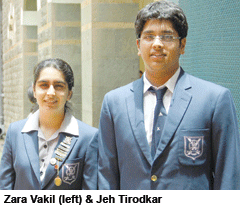 Jeh Tirodkar (JT) and Zara Vakil (ZV) are head boy and girl respectively of Cathedral and John Connon School, Mumbai — India’s second-ranked day school in the EW-C fore India’s Most Respected Schools Survey 2011.
Jeh Tirodkar (JT) and Zara Vakil (ZV) are head boy and girl respectively of Cathedral and John Connon School, Mumbai — India’s second-ranked day school in the EW-C fore India’s Most Respected Schools Survey 2011.
Has corruption roadblocked India’s socio-economic development?
JT: The scale of corruption in our country is unimaginable. It’s deep rooted and has penetrated every segment of society. Of course it’s hampering India’s socio-economic growth in a big way. Even the best social welfare programmes will fail if the malaise of corruption is not addressed.
Do you support Anna Hazare’s campaign against corruption and his version of the Jan Lok Pal Bill?
ZV: I support Anna Hazare’s crusade against corruption, but I’m not sure whether he is using the right means. Fasting is threatening. Rather than a few people taking things in their hands, we should try to make our elected governments work.
Have you ever encountered corruption in your personal life?
JT: Anyone who says he hasn’t experienced corruption in India is less than truthful. Corruption is so rampant that you don’t need to look beyond an average day to notice its incidence. Everybody is quick to point out political or official corruption but nobody talks about personal corruption — for instance paying bribes for getting extra FSI (floor space index) in Mumbai.
How much awareness is there in your school about corruption in public life and governance?
ZV: The best way to create awareness is by way of constant communication. That’s what we are trying to do through our magazine Spectrum, which eight of us started post 26/11. The June 2011 issue was entirely devoted to corruption.
Is a corruption-free India possible?
JT: The several ministers charged with corruption who are now in jail gives me hope. With sustained public pressure, corruption can be curtailed. In fact this campaign against corruption will become a revolution which will hope-fully change our country forever.
ZV: Of course, it’s possible but it will take time and persistence, and strong public willpower to make it happen.
Corruption deeply entrenched
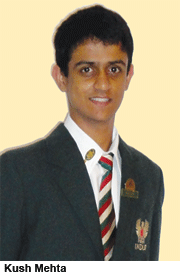 Kush Mehta is head boy of the IBO-affiliated Indus International School, Bangalore, India’s second-ranked international school in the EW-C fore India’s Most Respected Schools Survey 2011.
Kush Mehta is head boy of the IBO-affiliated Indus International School, Bangalore, India’s second-ranked international school in the EW-C fore India’s Most Respected Schools Survey 2011.
To what extent do you believe corruption has blocked India’s socio-economic development?
Corruption has stalled infrastructure development, as all the money allocated for these projects is pilfered. Socially, it has created public apathy, and bribe-giving and taking is considered an acceptable way of resolving difficult situations. Consequently, even though we have made considerable progress in the past 64 years, we lag behind most countries in human development, literacy, power generation, and primary health facilities.
Do you support Anna Hazare’s campaign against corruption and his version of the Jan Lok Pal Bill?
I support Anna’s stand against corruption. Although unorthodox, his campaign has made the country sit up and take notice of the issue. However there are sections of Team Anna’s proposed Jan Lok Pal Bill that I don’t entirely agree with.
Have you encountered corruption in your personal life?
Corruption is not an Indian phenomenon. In Kenya for instance, corruption is rife especially within the police force. My most traumatic experience was when my uncle and I were stopped by a team of Kenyan policemen who had blocked a roundabout we were driving past. They demanded money for an alleged traffic violation. We had no choice but to pay.
How much awareness is there in your school about corruption in public life and governance? Have you tried to create awareness of this issue?
Awareness of national and global events is high among our stud-ents. During Anna Hazare’s campaign, animated discussions were held within the student body and between students and teachers. I have also tried to highlight this issue in the Model United Nations conferences.
Is a corruption-free India possible?
Corruption is deeply entrenched within the administrative system. It is difficult to decide whether corruption should first be dealt with at the higher levels, or at the grassroots. It is also somewhat idealistic to think that corruption can be completely eliminated. It can be significantly reduced, if people refuse to tolerate it.
Corruption-free India a distant dream
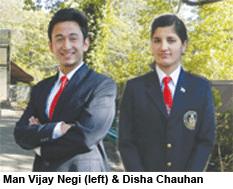 Man Vijay Negi (MVN) is head boy and Disha Chauhan (DC) head girl of The Lawrence School, Sanawar — India’s fourth-ranked boarding school in the EW-C fore India’s Most Respected Schools Survey 2011.
Man Vijay Negi (MVN) is head boy and Disha Chauhan (DC) head girl of The Lawrence School, Sanawar — India’s fourth-ranked boarding school in the EW-C fore India’s Most Respected Schools Survey 2011.
To what extent has corruption roadblocked India’s socio-economic development?
MVN: Corruption is really hampering India’s socio-economic development and growth. But it’s not a major roadblock. The quality of governance is the key determinant of growth. Good governance will lead to good developmental outcomes.
DC: Corruption has without doubt impeded India’s development. All the money which has been lost due to the 2G and Commonwealth, among other scams, could have been utilised for the benefit of the country’s poor.
Do you support Anna Hazare’s campaign against corruption and his version of the Jan Lok Pal Bill?
MVN: A strong anti-corruption watch-dog is definitely required. However, the Jan Lok Pal Bill is not the only remedy for eradicating the menace of corruption. Anna Hazare’s movement against corruption reflects everyone’s concerns. The Lok Pal Bill is a much needed medicine which unfortunately is being administered after the sickness has spread too wide. To stop corruption, we must reform the institutions of governance in this country. Reforms in administration, the police force and judiciary are urgently required and must be given first priority. Corruption will reduce significantly if decision-making is transparent, discretion is reduced and delivery of citizen services are made time-bound.
How much awareness is there in Lawrence, Sanawar about corruption in public life and governance?
MVN. Not much emphasis is given to this important subject in school. There is general deterioration in the moral and ethical values in our society. We don’t speak out against corruption due to sheer apathy. Schools and educational institutions have an important role in character-building and inculcating moral values. They have to lead by example and set high moral standards for teachers and students.
DC: Yes, we are aware of corruption and discussions do take place, but we could do with more of them.
Is a corruption-free India possible?
MVN: A corruption-free India is a distant dream. We need to realise that our society/system is not something outside us, but an integral part of us. So to improve the system, we need to improve ourselves first. Change like charity, must begin at home.
DC: Looking at the present scenario, a corruption-free India seems difficult to achieve. But I believe when the public starts taking responsibility for their actions and elects political leaders with care, we can reduce corruption.
Politicians not solely to blame
.gif) Pearl Raphael is head girl of the Maharashtra state board-affiliated Bombay Cambridge School, Mumbai.
Pearl Raphael is head girl of the Maharashtra state board-affiliated Bombay Cambridge School, Mumbai.
To what extent has corruption blocked India’s socio-economic development?
Corruption has blocked development in many ways. Politicians work half-heartedly because they are making money through corrupt means and are not bothered about failed projects and schemes. But politicians are not solely to blame. Civil society is equally responsible for the corruption rampant in our country. In such a scenario, how can we expect progress?
Do you support Anna Hazare’s campaign against corruption and his version of the Jan Lok Pal Bill?
Though the cause is just, the method of protest is questionable. Just because fasting worked for Gandhiji, it doesn’t mean it will work for anyone or everyone. The important thing is there should be some quick outcome of action. But nothing much seems to be happening. I don’t approve of fasting as a means of protest.
Have you personally experienced corruption?
I observe it almost every other day. Someone jumps a traffic light and gets away by paying a few bucks to the cops. Yet another example is that in most parts of Mumbai, roads are either dug up or ridden with potholes. Do you see any other cause other than corruption for this?
How much awareness is there in your school about corruption in public life and governance?
Certainly there is awareness about this issue in our school and we often discuss it in class. Sometimes while discussing corruption, we get agitated and angry that such terrible scams are happening in our country.
Is a corruption-free India possible?
It will take tremendous time and effort, but it is possible. The public should protest actively against corruption. If we see any public incidents of bribery, we should be brave enough to confront, question and promptly lodge a complaint against the concerned person. Technology and the internet can be used effectively to deal with corruption. Imagine how much pressure a live post on the internet or TV clip of an illegal act will have on the accused.
Heavy blanket smothering India
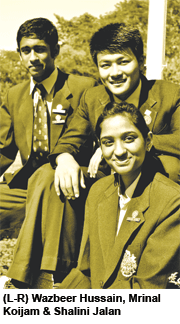 Mrinal Koijam (MK) is school captain, Shalini Jalan (SJ) head girl and Wazbeer Hussain (WH) head boy of the Assam Valley School (AVS), Balipara.
Mrinal Koijam (MK) is school captain, Shalini Jalan (SJ) head girl and Wazbeer Hussain (WH) head boy of the Assam Valley School (AVS), Balipara.
To what extent do you believe that corruption has blocked India’s socio-economic development?
MK: Corruption is, and always has been, the biggest roadblock in India’s socio-economic development. It’s stopping India from being the best.
SJ: Socio-economic development cannot be achieved until all citizens are brought under the rule of law which demands that liberty, equality and justice be provided to all. This is not happening because of corruption.
WH: Seventy percent of India’s GDP is produced by 30 percent of the population. This inequality is encouraged by corruption and has blocked development.
Do you support Anna Hazare’s campaign against corruption and his version of the Jan Lok Pal Bill?
MK: As it was throughout the country, in AVS too, chants of ‘Go Anna’ were heard, not long back. I fully support Anna Hazare’s campaign against corruption — it has given a voice to the masses who were completely fed up with corruption.
SJ: This movement has effectively mobilised the public against corruption. Politicians only listen to public opinion, and mass movements are weapons of social and political change.
WH: Anna Hazare’s campaign against corruption is a revolution. However, I don’t fully agree with the methods of protest adopted. The continuous attacks on a democratically elected govern-ment have undermined its authority.
How much awareness is there in AVS about corruption in public life and governance?
MK: There is a lot of awareness among students about corruption in public life. This is a hot topic which is regularly discussed in debates, assembly, and in our in-house newspaper.
Is a corruption-free India possible?
MK: Corruption is a heavy blanket smothering India, yet there is a ray of hope. If the youth really want a corruption-free country, nothing can stop us.
SJ: India will be rid of corruption only when we as individuals learn to say no to corrupt practices.
WH: If the Jan Lok Pal Bill is implemented with success, then we can look forward to reduction in corruption. Transfer of political power to youth also seems like a great step towards a corruption-free India.
Huge impediment to development
.gif) Tushar Bhasin (TB) is vice president Students Council; Anahita Kgti (AK) vice head girl and Aman Agarwal (AA) vice head boy of Delhi Public School, R.K. Puram.
Tushar Bhasin (TB) is vice president Students Council; Anahita Kgti (AK) vice head girl and Aman Agarwal (AA) vice head boy of Delhi Public School, R.K. Puram.
To what extent has corruption blocked India’s socio-economic development?
TB: Pervasive corruption is a huge impediment to national development. India is a young nation and it affects the youth badly.
Do you support Anna Hazare’s campaign against corruption and his version of the Jan Lok Pal Bill?
AK: We support the anti-corruption campaign but not the means employed by Team Anna. Holding the government to ransom sets a bad precedent. Public awareness about the content of the two Bills — Team Anna’s draft and the government version — is very low. Since we don’t really know what they contain, how can we say which one is better?
Have you encountered corruption in your personal life?
TB: Not personally. But yes, I’ve often seen traffic police take money from citizens for violations.
AK: Once myself and my sister, who was driving, were stopped by traffic police. They threatened to take us to the police station if we didn’t pay up Rs.200. We paid and drove off. This is very common.
AA: My dad is looking to buy a property but all his income is white. We can’t pay any money in black as demanded by brokers. That’s when I understood what black money and corruption is all about.
How much awareness is there in DPS, R.K.Puram about corruption in public life?
TB: Frankly, we haven’t done much research on this issue except for poster competitions and campaigns. But we’re alive to what is happening around us and follow and discuss national issues. And some of us even went to Ram Lila Maidan during Anna Hazare’s fast.
Is a corruption-free India possible?
AA: It is a utopian thought but definitely things can get better. Development of transparent and simple processes to access government services, stringent anti-corruption laws and complaint redressal forums can make this happen. Everybody must make a personal promise not to pay bribes.
Develop zero tolerance
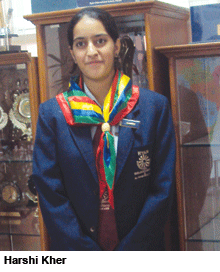 Harshi Kher is president, student cabinet, Ryan International School, Vasant Kunj, Delhi.
Harshi Kher is president, student cabinet, Ryan International School, Vasant Kunj, Delhi.
To what extent do you believe corruption has stymied India’s socio-economic development?
Corruption has seeped into the grassroots of every aspect of public life. This evil has washed away the dreams and aspirations of millions of people. In a country where whistle-blowers get killed, people with accounts in Swiss banks rule and scams are exposed everyday, it’s difficult for the youth to find role models in public life.
Do you support Anna Hazare’s campaign against corruption and his version of the Jan Lok Pal Bill?
Though I support the anti-corruption campaign, I don’t agree with the means of protest adopted by Anna Hazare. Delhi came to a standstill while he sat on his fast in Ram Lila Maidan. The Jan Lok Pal Bill is not the only way to fight corruption as we have enough laws like IPC/CPC. What we lack is execution and proper implementation of these laws.
If law-makers are willing to enforce existing laws, we wouldn’t need any new Bills. However it’s refreshing to see an honest and unselfish leader like Anna Hazare in the public domain.
Have you encountered corruption in your personal life?
Several times. In my neighborhood, I have seen friends who are underage driving scooters and cars, and getting away by paying bribes.
How much awareness is there in your school about corruption in public life and governance?
Ryanites are well-read and aware of the current socio-political situation in India. Our debating club has discussed corruption many times and essay-writing competitions have been conducted on related topics.
Is a corruption-free India possible?
I firmly believe it is possible if we develop zero tolerance towards corruption. Making India corruption-free is not something which can be achieved in one or two five-year plans. It’s a very long process, but it will happen.
Check the damage quickly
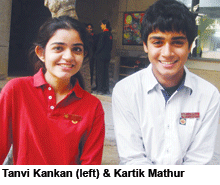 Kartik Mathur (KM) is head of the Student Council, The Shri Ram School, Delhi/Gurgaon — ranked India’s No.1 day school in the EW-C fore India’s Most Respected Schools Survey 2011 — and Tanvi Kankan is chief editor of the school magazine.
Kartik Mathur (KM) is head of the Student Council, The Shri Ram School, Delhi/Gurgaon — ranked India’s No.1 day school in the EW-C fore India’s Most Respected Schools Survey 2011 — and Tanvi Kankan is chief editor of the school magazine.
To what extent do you believe that corruption has blocked India’s socio-economic development?
KM: There is no doubt that corruption has blocked India’s socio-economic development. It has seeped very deep. The damage must be checked quickly before it causes irreparable loss.
Do you support Anna Hazare’s campaign against corruption and his version of the Jan Lok Pal Bill?
KM: While I have the utmost respect for Anna Hazare as a social reformer, I don’t believe in his fight for the Jan Lok Pal Bill. While the Bill will reduce corruption, it in itself is being brought in by corruption, i.e unjust means. If Anna Hazare believes that fasting until death and holding the government to ransom is fair, then he too is corrupt. We need an independent body to check his version of the Lok Pal Bill.
TK: Though I support his campaign against corruption I’m not sure if I completely agree with his version of the Lok Pal Bill. There should be more discussion and debate.
Have you encountered corruption in your personal life?
KM: I live in DLF, Gurgaon. We have been experiencing major water scarcity for a long time. One summer, a water tanker driver told me he would only give us half the tanker. When I asked why, he said he would give the other half only if we agreed to pay him Rs.100.
How much awareness is there in your school about corruption in public life and governance?
TK: There is a fair amount of awareness in our school about these matters. Each class has the responsibility of staging an assembly in the calendar year and one of the classes recently took up the corruption issue, highlighting its prevalence in our daily lives, and how we should make sure we’re not encouraging it in any form.
Is a corruption-free India possible?
KM: Yes. But that will only come once the need to be corrupt is eliminated. Today, due to social backwardness, people engage in corrupt activities. Poverty can be eradicated through economic development as opposed to just economic growth.
Anna’s great service to country
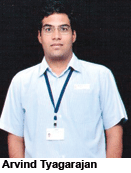 Arvind Ram Tyagarajan, head boy of the CISCE-affiliated Sishya School, Chennai.
Arvind Ram Tyagarajan, head boy of the CISCE-affiliated Sishya School, Chennai.
Has corruption blocked India’s socio-economic development?
Though India has achieved consid-erable socio-economic progress since independence, it still has a long way to go with a sizeable percentage of the population living below the poverty line. I believe the problem is not unavailability of resources, but of massive diversion of funds through rampant corruption in public adminis-tration and kickbacks for permits and licenses etc. Such large-scale corruption has, to a great extent, blocked India’s socio-economic development.
Do you support Anna Hazare’s campaign against corruption and his version of the Jan Lok Pal Bill?
Anna Hazare is doing a great service to the country with his selfless and unrelenting campaign against corrup-tion. I strongly support his campaign for legislation which will at least reduce corruption, if not eradicate it. About the Jan Lok Pal Bill, I am in agreement with the broad thrust of the Bill. However, I feel adequate time should be provided for debate and discussion of its provisions.
How much awareness is there in Sishya about corruption in public life?
Students, especially in senior school, are well-informed about current affairs related to politics and governance, thanks to the study of civics in the ICSE curriculum. As head boy, I highlighted the issue of corruption by organising a signature campaign by students in support of Anna Hazare’s fast and campaign in April. It received media coverage in The Hindu and NDTV.
Is a corruption-free India possible?
I believe the process of eradicating corruption has only just begun. The swell of support for Anna Hazare’s campaign has built a strong foundation for the anti-corruption movement and even the political class has been taken aback by the intensity of public anger. But this process will take time and is bound to be challenged by vested interests. Nevertheless, as a young citizen of this country on the threshold of becoming eligible to vote, I am optimistic that in my lifetime, India will be substantially rid of this menace which has eaten into the country’s progress.
Corruption exists because people support it
.gif) Harisankar Mahapatra (HM) is head boy and Sonali Sharma (SS) head girl of the CIE (UK) and CBSE-affiliated Sai International School, Bhubaneswar.
Harisankar Mahapatra (HM) is head boy and Sonali Sharma (SS) head girl of the CIE (UK) and CBSE-affiliated Sai International School, Bhubaneswar.
To what extent do you believe that corruption has set back India’s socio-economic development?
HM: Corruption has not spared any area of public life ranging from the lower bureaucracy to the higher judiciary, leading to widespread discontent within the public which has resulted in the nationwide campaign against corruption.
Do you support Anna Hazare’s campaign against corruption and his version of the Jan Lok Pal Bill?
HM: Though I support and respect the cause behind the campaign, I feel the means adopted are unconstitutional. It’s sheer blackmail. There are better ways to fight corruption and a single-point agenda of the Jan Lok Pal Bill cannot end something that’s so deep-rooted.
SS: I fully support Anna Hazare’s campaign against corruption and the Jan Lok Pal Bill. Inclusion of the prime minister and judges of the Supreme Court and high courts is crucial if we are serious about fighting corruption.
Have you encountered corruption in your personal life?
HM: Yes, I have encountered corruption and in fact exposed a corrupt official on a regional television channel.
SS: My family was travelling by train to Delhi. We had two reserved AC berths against the requirement of one more berth. The ticket collector wanted a bribe but my father refused to pay.
How much awareness is there in your school about corruption and have you tried to create awareness of this?
SS: I have made an attempt to spread awareness among my friends but more needs to be done institutionally. We should organise talks by eminent speakers on corruption, more student debates and discussions.
Is a corruption-free India possible?
HM: Corruption exists because people support it for personal benefit. If as citizens we put the nation’s interest ahead of our own, corruption will reduce. Laws are ineffective unless we implement them efficiently.
SS: A corruption-free India is a difficult proposition. However, the massive public support for Anna Hazare is proof that people have had enough, and it’s time for this pervasive evil to go. This is a healthy and positive change.
With Autar Nehru & Payal Mahajan (Delhi); Manas Shrivastava (Mumbai) & Hemalatha Raghupathi (Chennai)